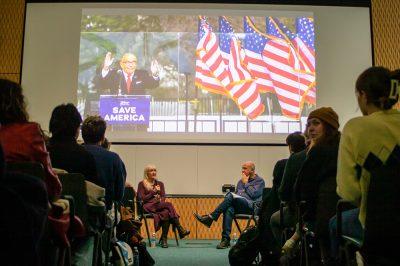In contrast to the flowers and greenery in front of the College of Communication, posters with harrowing photos of people from the Ukraine war were displayed on the COM Lawn. The photos include an aging woman who is unable to escape the shelling in Ukraine as well as another woman crying as she looks at the body of her dead son.
These are some of the photos taken by four-time Pulitzer prize winner, photojournalist Carol Guzy. Guzy accepted her Hugo Shong award for lifetime achievement, presented by COM on Nov. 1. Guzy is the only journalist to receive four Pulitzer prize awards for photography.

“Of course, I photograph war just to hopefully wake people up and say we gotta stop causing so much suffering to each other,” Guzy said. “It’s just mind boggling.”
Her career has brought her across the world, documenting the horrors and hope in situations like the deadly earthquakes in Haiti and the aftermath of Isis in Mosul. The posters were part of an exhibition of her work on the COM lawn throughout October.
Guzy grew up in a working-class town in Pennsylvania and initially graduated college with a nursing degree. However, when she went to the Art Institute of Fort Lauderdale for a photography program, it became transparent that photography was her passion.
Over the next few decades, she transitioned from working at the Washington Post and other newspapers to freelance work, all in the pursuit of photographing the “human condition.”
Although a lot of her acclaimed work involves tragedy, such as her first Pulitzer Prize for work documenting a horrific volcanic mudslide in Colombia, Guzy said she is not a war photographer. She said she also tries to seek out stories that involve hope and happiness.
“It’s hard not to get debilitated by some of the awful things you’ve witnessed, but I’ve learned how to cope,” she said. “I’ve learned that what we do is so vital and it’s bigger than all of us.”
Greg Marinovich, a COM master lecturer and Pulitzer Prize winning photojournalist, was the host of the Nov. 1 conversation with Guzy.
“She wants to impart dignity to a subject, she wants to give them a voice and she also wants to imprint what she thinks about it and represent that through them,” Marinovich said. “She does all those things incredibly eloquently.”
Guzy said she believes that people should not go into a story with a preconceived idea.
“I think that we just have to let the story tell itself, and we just photograph it,” Guzy said.
As for the photos, Guzy said the most important things are the moments themselves.
“It’s not what people are doing,” Guzy said. “It’s how they’re feeling. I’m always looking for the feeling of what’s happening.”
In a room full of speechless COM students, many were touched by Guzy’s work and found it to be eye-opening.
“We’re living in such a steady and happy life right now that we can never imagine there’s a world where there’s a conflict,” said Hsuan Ma, a second year COM graduate student. “I really appreciate that … there’s a person to do that kind of work, to tell that story, that people cannot approach in normal situations.”
Guzy learned throughout her career that “anything that can go wrong usually goes wrong.”
“The most important thing I’ve learned is that we all are human and we have to forgive ourselves,” she said.
Marinovich said he thinks that taking time to photograph a subject is a key takeaway that aspiring photographers could learn from Guzy’s work.
“If you give time, your chance of getting something meaningful and lasting increases exponentially,” he said.
When it comes to her accolades, Guzy believes that her awards are not only meaningful to her but that they also “give photos another life.” While talking about the photos that she won awards for, she said, “however they were republished, this is all of a sudden another way that they’re out there and people are looking at them, talking about them again.”
Although she admits that it is more dangerous to go to areas in conflict as she gets older, she does not want to quit anytime soon.
“Until my last breath, if I’m healthy, I’ll be holding my camera and I’ll be taking pictures if I can.”











